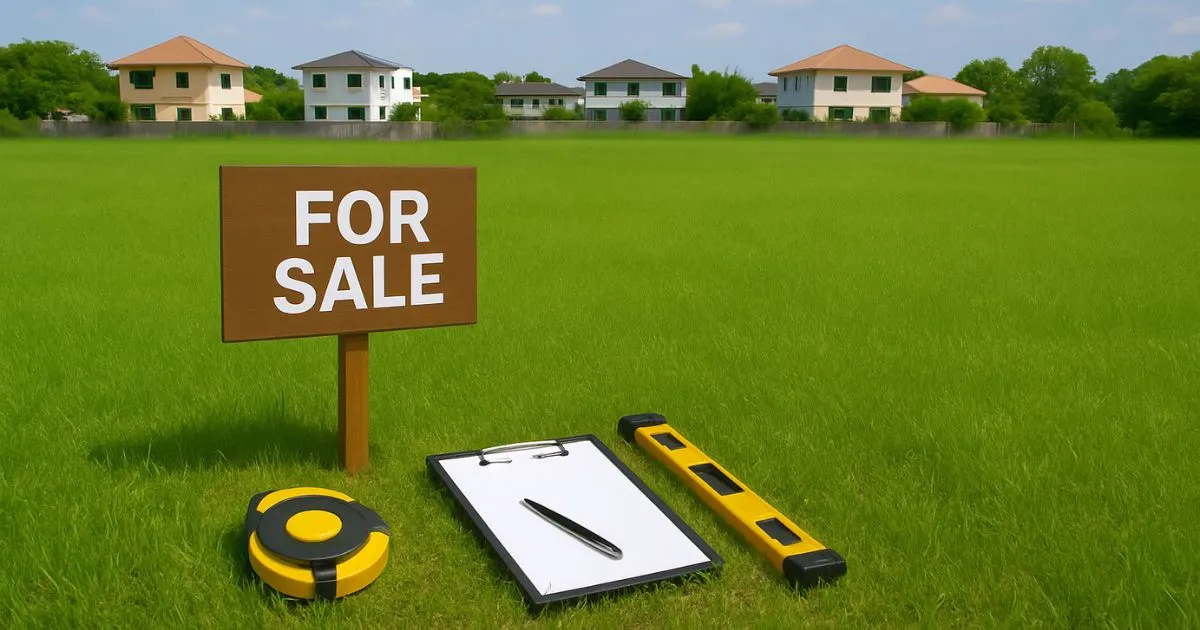
Among all real estate investments, purchasing a plot is considered one of the most beneficial ones. It allows for flexibility, considerable returns, and the opportunity to build a home or develop a commercial property. Although buying plots of land is easier than buying a home, it has its unique challenges. There is a lot of risk, and most buyers, particularly novice investors, get trapped in several plot purchase mistakes that lead to the loss of considerable time, resources, and peace of mind.
Regardless of whether the plot is for personal or investment purposes, it is essential to understand the common pitfalls in land deals. This article outlines seven traps to sidestep and offers several pointers on things to check before buying a plot to help avoid legal and financial complications.
Mistake: A significant plot purchase mistake that buyers make is failing to properly verify ownership documents and title deeds.
Why it is dangerous: Especially in outskirts of cities or towns, it is common to encounter forged plots and land ownership disputes. There is a high risk of buying land that multiple people claim to own or land that is owned by a con artist. This is a classic example of how to avoid plot fraud.
What to do:
Mistake: A large number of buyers purchase plots without considering the zoning classifications, land-use permissions, or the conversion status.
Things to check before buying a plot:
Mistake: Purchasing plots within unapproved layouts or outside boundaries without the requisite permissions from the authorities.
Why it is dangerous: If building permits are required post-purchase, the buyer is likely to face demolition notices or heavy fines.
Things to check before buying a plot:
In the case of plots that are part of gated communities, ensure the entire development is registered with RERA and has commencement and completion certificates. If you are looking for investment-ready land, exploring plots in Jewar can be a good starting point as the area has multiple approved developments.
Plot buying tip: Steer clear of "proposed" or "under process" layout plots unless all documents are meticulously vetted for clarity and legal soundness.
Mistake: Not measuring the area and relying solely on paperwork or verbal assurances.
Why it is dangerous: If encroachments, undersizing, oversizing, or boundary misplacement occurs, conflicts with neighbors, local authorities, or the government are inevitable. A physical survey is one of the top things to check before buying a plot.
How to defend against plot fraud:
Mistake: Falling under the guise of low-priced plots and appealing discounts without a detailed cost analysis.
Why it is dangerous: Often, it is a trap. Legal, zoning, or location issues may be the reason. Additional hidden costs like development surcharge, registration fee, and GST are common. This is also a key way to avoid fake plots.
Plot buying tips:
Avoid fake plots: Pricing that seems too appealing should immediately raise red flags.
Mistake: Buyers often purchase plots in secluded regions, relying exclusively on speculative future developments.
Why it is dangerous: The absence of access roads, drainage systems, and utilities can stall construction, making it impossible to start building.
Things to check before buying a plot:
Plot buying tip: Buy land in regions with active or completed infrastructure projects. Avoid relying on areas with only "planned" development.
Mistake: Relying solely on the builder’s statements or making decisions without professional guidance.
Why it is dangerous: Legal documents are complex, and a non-expert can easily miss crucial details. This is one of the most expensive plot purchase mistakes you can make.
How to protect yourself from plot scams:
Plot buying tip: Spending a small amount on expert legal advice can save you a fortune in the long run.
1. What is the most common mistake while purchasing a plot?
The most common mistake is not verifying the land title and ownership. Many buyers skip checking legal documents properly, which often leads to disputes or fraud. Always confirm papers with a lawyer before buying.
2. Why is verifying the land title so important?
Because fake ownership papers and disputed plots are common. If you do not check the title deed, tax receipts, and ownership history, you might end up buying land that does notlegally belong to the seller. Always get a legal expert to verify the title.
3. Is it risky to buy plots in unapproved layouts?
Yes. If the layout is not approved by the local authority, you could face demolition notices or penalties later. Always ask for layout approval letters, NOCs from departments, and RERA registration if it’s part of a project.
4. Do I really need to measure the plot physically?
Absolutely. Many buyers later discover the land is smaller than promised, wrongly marked, or encroached by neighbors. A site visit and survey map from an authorized surveyor will confirm exact boundaries and prevent disputes.
5. Is connectivity and infrastructure really that important?
Yes. Without access roads, electricity, or water, construction may not even begin. Check if the plot has proper road access and basic utilities, and avoid land that depends only on “future” development promises.
6. Do I really need a lawyer to buy a plot?
Yes. Land papers are complex, and missing one small clause can cost you lakhs. A lawyer can check ownership, prepare agreements, and ensure you don’t get scammed. A small legal fee is better than a huge financial loss.